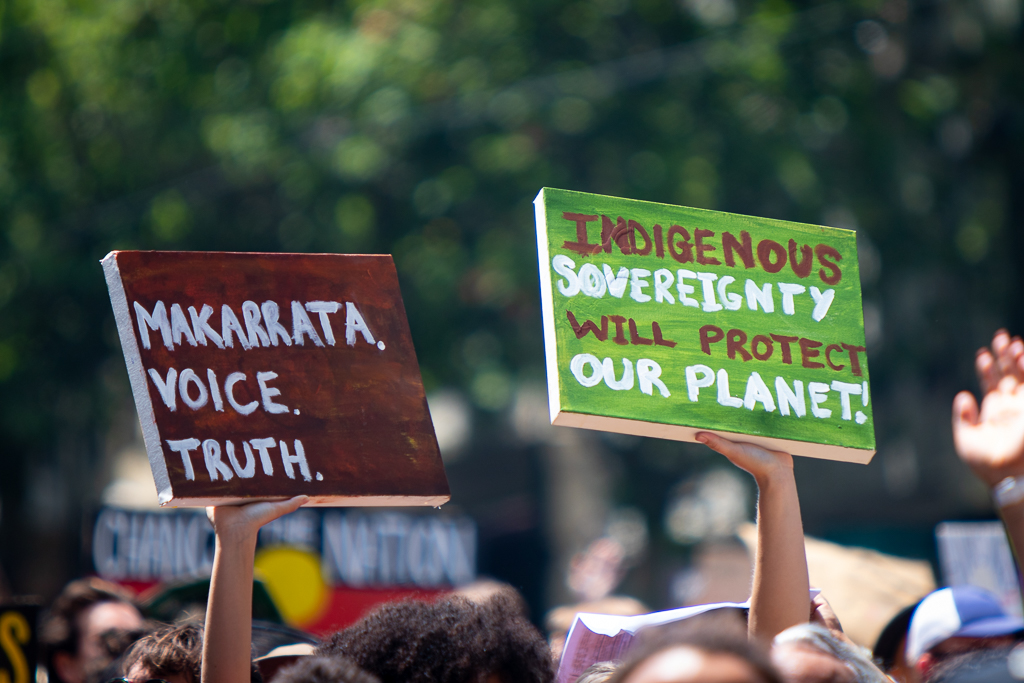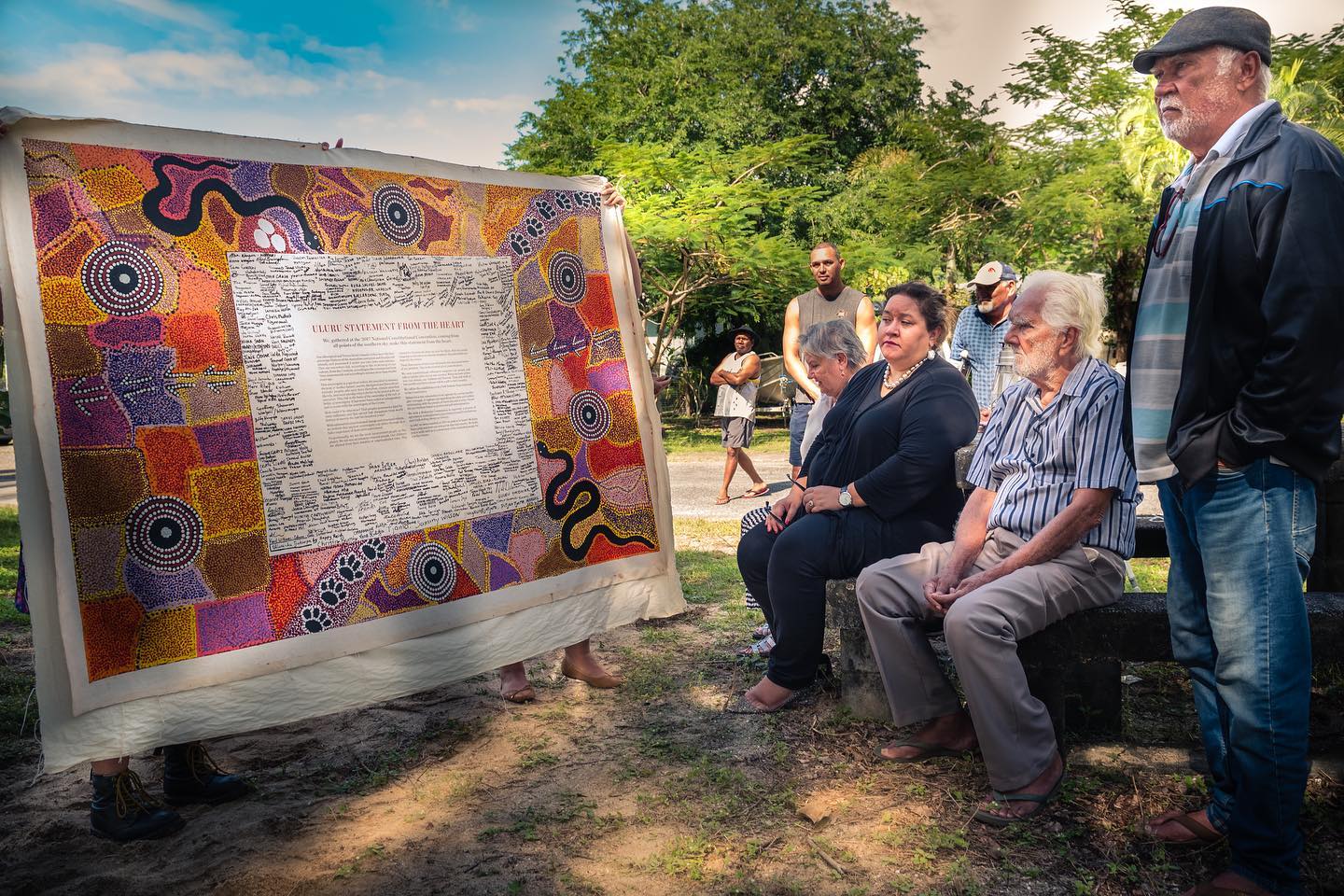By Stuart Rees
There is a huge contrast between the notion sovereignty depicted in the Uluru Statement from the Heart and political leaders’ perception of this concept as a weapon. Uluru’s message forecasts hope through reciprocity and healing. Politicians present sovereignty as a rampart to be defended, even as a justification for attack. Clothed in threats of violence, their noise about sovereignty can be deafening, but if redefined, sovereignty could promote non-violence and be music to our ears.
In their Makarrata prescription for people coming together after a struggle, the Uluru authors insist that an ancient sovereignty can shine as a fuller expression of Australia’s nationhood. The vision is humane, the language generous. Makarrata “captures our aspirations for a fair and truthful relationship with the people of Australia and a better future for our children based on justice and self-determination.”
Simultaneous with publicity about the Uluru statement, Russian, Chinese, US and Israeli leaders were repeating that sovereignty should be defended by military operations. By muttering the word, they could claim a moral justification for extending national borders, even for invading other countries.
Australians marshal similar arguments. When ABC’s Sarah Ferguson asked Defence Minister Richard Marles whether alliance with the US would mean giving up some of Australia’s sovereignty, the Minister answered, “No, but sovereignty is a really important question… having sovereignty really matters and submarines are a good example of that.”
Conventional appeals to sovereignty look like fraud. Nations’ supposed independence can be protected by finding and dominating enemies. States’ borders can be respected by threats to kill and destroy. By contrast, Uluru questions a view of sovereignty which is explained by reference to force of arms.

By rejecting uncritical reverence for a nation’s supposed independence, sovereignty can be redefined. It needs to be. Climate change catastrophes, world-wide pandemics, and threats to existence from the use of nuclear weapons, respect no borders. Conventional posturing about sovereignty is irrelevant.
The architects of Makarrata speak of ancestral ties between the land or ‘mother nature’, of fair and truthful relationships. Their aspirations - respectful, inclusive, non-violent - express commitment to values which have also inspired musicians, artists and poets.
We can draw unashamedly from poets. Over centuries, some have been warlike, but most, in their advocacy of non-violence and inclusiveness, have challenged dominant views of power. The Russian poet Yevgeny Yevtushenko described a “freedom of sovereignty where everyone has power and conscience is the only power.” The Australian Indigenous poet Jack Davis observed that his people had maintained dignity despite brutality.
“White fella wrong, call each other liar, Should have sat down quiet and talked by fire.”
That forgiving, inspiring artist, the late Archie Roach, sang, “They took the children away”, but when introducing that song, he said, “I don’t want to see my people destroyed anymore.” His sons judged their father “A healer and unifying force. His music brought people together.”

In his rejection of the idea that sovereignty requires swagger and domination, the pacifist American poet William Stafford sounded as though he would be damning the promoters of wars in Yemen, Ukraine, Ethiopia and Chinese warfare around Taiwan.
“Sometimes commanders take us over, and they Try to impose their whole universe, how to succeed by daily calculation: I can’t eat that bread.”
In her poem, ‘These Strangers in a Foreign World’, American poet Emily Dickinson advocated inclusiveness and respect for the vulnerable. She asked privileged people to imagine themselves powerless.
“These Strangers in a foreign World, Protection asked of me— Befriend them, lest Yourself in Heaven Be found a Refugee.”
Sovereignty as a multi-dimensional expression of power- like a Mahler Symphony I once thought – highlights inclusiveness, embraces human rights and outlaws racism. In that vein, and in her poem ‘All One Race’, Indigenous poet Oodgeroo Nunucaal foreshadowed the spirit of Uluru:
“I’m for all humankind, not colour gibes; I’m international, and never mind tribes… I’m international, never mind place; I’m for humanity, all one race.”
In prose too, advocates of a common humanity have echoed these poets. In ‘Reimagining the Future’ (2000), Joe Camilleri argued that democratic governance could ensure greater equality in people’s access to knowledge and influence. In ‘Human Rights Horizons’ (2000), Richard Falk showed how humane governance depended on respect for human rights and on reverence for non-violence.
Each author painted an all-inclusive, cosmopolitan view of sovereignty, but instead of heeding their warnings, militaristic interpreters of sovereignty persist. Even language is murdered. Abusive power, arming every nation, calling destruction a means of defence, can somehow protect people by killing them, let alone by ending life on earth.
In Australia at least, the Uluru Statement from the Heart perceives sovereignty as a cue for inclusiveness, for non-violence, for friendship and for experiences of unity by people walking together. It offers exciting, life enhancing prospects and a new definition of sovereignty.

Stuart Rees OAM is Professor Emeritus, University of Sydney, recipient of the Jerusalem (Akl Quds) Peace Prize and author of the new book “Cruelty or Humanity”. A human rights activist, poet, novelist, and Founder Director of the Sydney Peace Foundation.
Feature image: Featuring the signatures of more than 250 First Nations leadership, the Uluṟu Statement is an invitation to the Australian people to walk with First Nations Peoples for a better future. Photo credit: The Uluru Statement of the Heart/facebook


